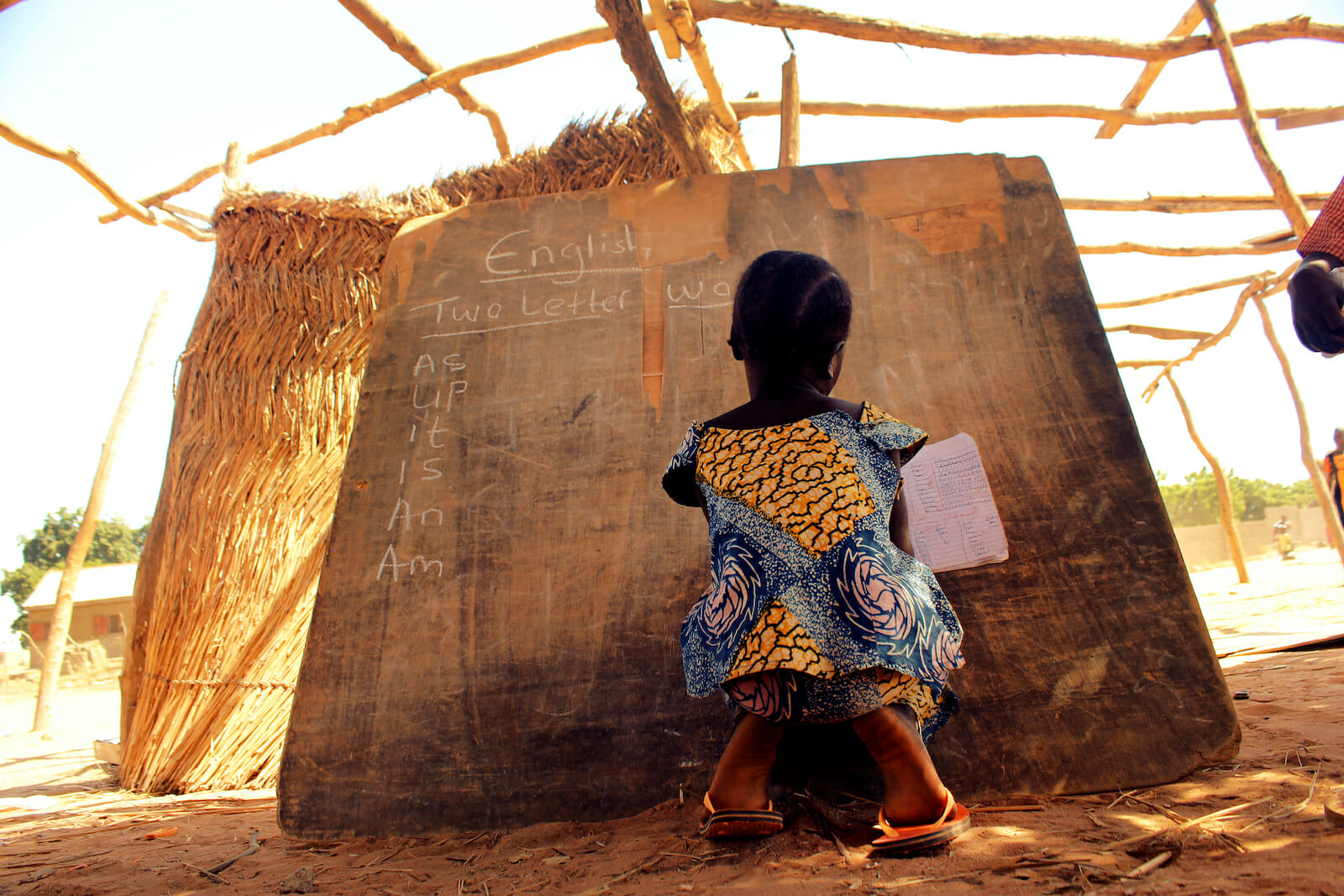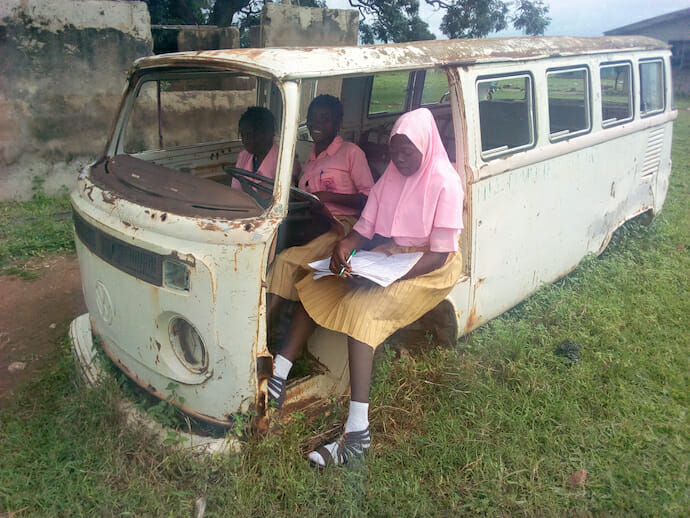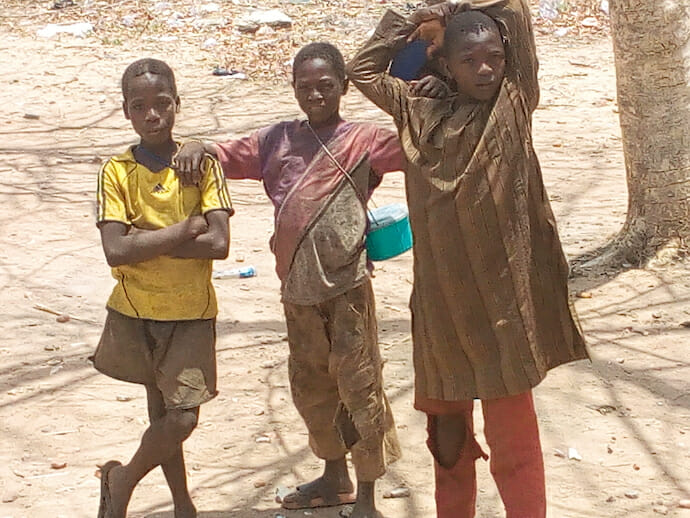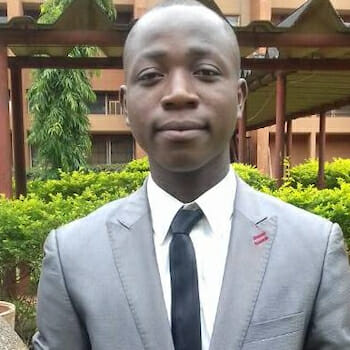
Not Only for the Rich: How NGOs in Nigeria are Championing Quality Education for Poor Children
KWARA, Nigeria – “Come and wash your plates, come and wash your plates,” Fatima, 8, bellows into the thin air at the sight of some corps members advancing towards her with plates in their hands.
It was 10 am. The atmosphere at the National Youths Service Corps’ (NYSC) Orientation Camp Yikpata, Edu Local Government of Kwara State in North Central Nigeria was bustling with activities.
Fatima sits on a heap of abandoned granites, savoring the hustle and bustle of the camp. She flings up a tiny pebble, watches it go high and then waits to catch it. At 8, she should be within the four corners of the classroom, but that rarely crosses her mind. For her, it’s survival first.
She is not alone.
She is flanked by other groups of girls within the age range of 10-14 who are also trying to eke out a living by washing dirty plates for corps members who cannot do that themselves and other menial jobs such as helping people to carry luggage to their destinations.
“This is what we do to feed ourselves,” she says, drops of tears trickling down her cheeks.
“We can’t go to school because there is nobody to sponsor us. We are only thinking about survival,” she adds, trying to retrieve her courage.
The NYSC scheme was one of the many initiatives trawled by the Nigerian government to foster unity across the country after a bloody civil war between 1967 and 1970. NYSC was created on 22 May 1973 as an avenue for the reconciliation, reconstruction, and rebuilding of the nation after the civil war. It was established based on decree No. 24 that stated that the scheme was created “with a view to the proper encouragement and development of common ties among the youths of Nigeria and the promotion of national unity.”
The scheme mandates every Nigerian who graduates from a higher institution- within or outside Nigeria- and below the age of 30, serves the country for one year during which, he or she would be expected to help in any capacity and be paid some monthly stipends.
An essential part of the scheme is a three weeks orientation training held across various states of the federation where Corp Members are housed in a camp. During the three-week exercise, the corps members are subjected to some intensive physical drills curated by military officials. Other activities such as empowerment and skill acquisition programs are also organized to help youths grapple with the unemployment situation in the country after the service.
For Fatima and the likes, this period is often an avenue to make money.
A plate washed goes for around .2¢ or more depending on their ability to haggle prices with their potential ‘customers,’ the Corp Members.

While the likes of Fatima and her friends get paid for washing plates and other services, others, mostly boys, within similar age brackets at the camp prefer the easy way: begging.
One is Ali, 12. His haggard dress betrays his young age- making him look older. Around his neck is a bowl hanging askew. Ali and his colleagues prefer the easy way- getting money by begging for alms from passers-by and raking up leftover food around the camp.
“I have never been to school before,” he says, struggling with words. He twisted and turned, opened left-over food and poured it into the bowl hanging around his neck, and then smiled.
According to the Universal Basic Education, Nigeria’s out-of-school population stands at 13.2 million up from 10.5 million. The data was obtained from a Demographic Health Survey (DHS) conducted in 2015 by the United Nations Children Fund (UNICEF) and the Nigerian government.
UBEC’s Executive Secretary Hamid Bobboyi quoted the findings of the survey in October at the Northern Nigerian Traditional Rulers Conference on Out-of-School Children pre-conference briefing in Abuja.
“If you add the number of children that have been displaced and the increasing number of birth, you find out that our source in DHS conducted by UNICEF published in 2015 reveals the number of out of school children increased to 13.2 million. Over the last few years, Nigeria has been besieged by Boko Haram and lots of children have been put out of school,” he had said during the pre-conference briefing.
Nigeria’s population is spiraling at the tick of every second without a corresponding increase in resources and basic facilities required for quality education. A UN report predicts that Nigeria will become the world’s third most populous country by 2050. The ballooning population is a worry to the country’s quest for quality education given there is no corresponding increase in budgetary allocation and infrastructure. Swathes of Nigeria live in extreme poverty. A recent report by report by Brookings Institution ranks Nigeria as the world’s poverty capital with a population of 200 million people- a position earlier occupied by India with a population of over a billion people.
“Nigeria’s population growth has put pressure on the country’s resources, public services, and infrastructure,” says a UNICEF report.
Failed by the system
While the likes of Fatima and Ali have never been to the four walls of a classroom, due to poverty, most people from poor backgrounds who eventually make it to school have nothing to be excited about. One of them is Afolabi Waliulahi, 16.
Growing up, Afolabi had a dream, to get a quality education and shock the world with his knowledge. Unknown to him was that that would come at a cost. A huge financial burden, that his family could hardly afford. His dream of getting a standard education is fizzling before him. His parents can only afford a community school which is poorly funded and lacks the necessary infrastructure to give him the desired quality education.
“We don’t have enough facilities for our academics. If you go to some schools, there are some facilities they use to aid in teaching and learning. In chemistry, for instance, they use some chemicals, seeing is believing. If they see some of these chemicals, they would understand that the theory aspect of our studies, but when this is not in place, the teacher only teaches us about the theoretical aspect of our subjects. It is more of cramming and pouring.”

Afolabi attends a community school in Kwara State, the country home of Nigerian Senate President, Bukola Saraki. There is no functional library in his school. The serious ones in the school make use of an abandoned vehicle parked within the school premises to read mostly during exams. His school also lacks instructional materials to aid learning. All they could get in subjects such as chemistry, physics, biology, and others requiring some practical is a note to read and regurgitate during exams. Such a rote-taking system of learning stifles quality education, analysts say but that is all Afolabi could afford.
He only got to hear of ‘Concord’ in English Language in SS2 just a class away from his West African Examination Council (WAEC) exam- a major requirement to gain entrance to tertiary institutions in the country. “The first time I heard of Concord, it was funny because we thought you are singing.”
“For me, this is not a school,” he says bemoaning the poor state of facilities in the school. “I only see as a lesson (a tutorial setting where students gather to learn). I usually tell my mummy that I don’t like this school but there is nothing I can do about it,” he said with a quaking voice.
“Before I came to this school, I know how to do everything. But since I came to this school, I feel relax, because I always emerge top of the class every year unchallenged,” he adds.
Like Afolabi, many Nigerians, those in the rural areas especially, are being failed by a system that couldn’t provide them with a quality education. Findings by this reporter revealed that most government-owned schools in the rural areas are in shambles with no facilities to aid teaching and learning. Most of the rural schools I visited in Benue, Kwara had sagging roofs, weak walls, and tattered floors.
The Nigerian government has introduced measures such as the school feeding program to increase the enrolment of pupils in schools. So far, the government claims $136 million has been spent on feeding pupils in public primary schools across 24 states of the country in the last two years. It adds that it is feeding 8.5 million children each school day under its school feeding programme across the country.
However, there are no commensurate efforts to improve the shambolic state of the educational sector which is blighted by many challenges.
Nowhere to go
Bad as the situation suggests, Afolabi and other Nigerian children have only one choice: endure the situation or forget education. “Only the poor will send their children to this kind of school, or which rich man in his right sense would that?” says one of Afolabi’s teacher told me in an interview.
However, this could hardly be the last choice for children from well-to-do homes in the country. Children of the highly placed in Nigeria hardly go to school in Nigeria and when they do; they only attend the crème de la crème in the society. Findings by this writer show the huge disparity in school fees of schools attended by the poor and rich. According to BUZZ Nigeria, parents pay as high as several thousand dollars in tuition fee for secondary school education for their children.
An analysis of the Federal Government budget allocation to education from 2000 to 2008 clearly confirms that the government is in the habit of allocating paltry sums to the sector, a Punch report reveals.
According to the report, the budgetary allocation to education was only 8.36 percent in 2000, which decreases to seven percent in 2001. In 2002, it increased again to eight percent while in 2003, it went down to seven percent, and rose remarkably to 12 percent in 2004 only to fall back to 11 percent in 2005 and 2006 respectively.
In 2008, budget allocation rose to 13 percent which is abysmally poor considering the minimum 26 percent budgetary benchmark recommended by UNESCO to enable nations adequately cater for the rising education demands.
In its budget proposal presented to the National Assembly, the Federal Government allocated 7.04 percent of the estimated $23 billion 2018 budget to the education sector. The allocation was below the 7.40 percent the Federal Government gave the education sector in its 2017 budget and way below that of 2016 wherein the Federal government allocated several billion out of the total budget to the sector.
NGOs to the rescue
For the likes of Afolabi Ali and Fatima, some NGO’s in the country are bracing the odds to ensure quality education for the less privileged and breathe hope to many who have had their dreams crumbling before them.
One of such NGO groups is We Care Without Borders Foundation founded by Emeka Obi, a graduate of the University of Nigeria, Nsukka (UNN) in Enugu State. Emeka and his team have been traveling the country, preaching hope through charity work. The mission of the group is “to care for the less privileged, feed the hungry and empower the hopeless.”
The group pushes its campaign primarily through a Facebook page and online platforms, where it draws attention to the plights of children going through challenges and updates followers with their progress.
“We basically started online,” says the founder of the group in a chat referring to Edith Ohaja– an online blog to get more details about the organization, a suggestion I welcomed.
Explaining how the group started, Ebuka said:
While I was an undergraduate student of UNN, precisely in the year 2009, I noticed that I had a lot of Facebook friends. That was the year that the rave of Facebook started blowing in Nigeria and we spent a lot of time online chatting. Most of these my Facebook friends were my classmates and other UNN students. I suggested to them that it will be cool if we can rally ourselves and visit an orphanage. To my surprise, a lot of them indicated interest and before the end of August 2009, almost 30 friends of mine came together and we visited the orphanage.
That outing was just the beginning. Today, by God’s grace, I have a full-blown foundation called We-Care Without Borders Foundation through which we are continuing the work. We-Care is a registered non-profit organisation facilitating and operating compassion outreaches in Nigeria with a focus on social and economic development. Our mission is to care for the less privileged, feed the hungry and empower the hopeless.
Since we started in 2009, we have been able to impact the lives of children in different orphanages such Our Place of Hope Orphanage, Opi, Enugu State; Our Saviour’s Orphanage Home, Delta State; Obinwanne Motherless Babies Home, Ede-Oballa and Nsukka Orphanage Home amongst others. We have also organised various outreaches such as Hope Alive Outreach where we visited Central Primary School, Agamaede in Isi-Uzo LGA in Enugu State and donated new school bags, new school uniforms and new school sandals to the pupils of the school who previously came to school barefoot, almost naked and used cellophane bags as school bags. It was quite painful watching the children in their frayed clothes.
We were also at the Durumi IDP Camp, Abuja, where we donated food items, toiletries, gift items to the displaced residents of the camp. We have also held outreaches in Makoko Slum, Lagos where the primary school children were given school bags, study materials, food items, etc. On the streets of Enugu city, we have fed the physically challenged and we have been to Edo State amongst other places.
I must thank all the members of We-Care: the Team Members, the State Co-ordinators and every person who has ever been part of the movement through encouragement, donations and joining us for an outreach. The foundation could not have become a success without them.
The group’s recent outreach was a visit to a community primary school, Uzam Ador, Aguamede in Isi-Uzo Local Government Area of Enugu State in South-eastern Nigeria.
The outreach was sponsored by Eze Okwudili Wilfred, an old student of the school based in Canada. He donated several thousand dollars to the Foundation to execute the project as part of activities to mark his birthday.
The recent outreach kickstarted with a campaign on Facebook, with pictures of children studying under a dilapidated building. The pictures generate public outrage, drawing the attention of the state government.
“When we posted pictures of the students on Facebook, we discovered that many people started sharing and it generated more awareness. This later got to the attention of the State government. When they (referring to the state government) saw the pictures, they stepped in and built a constructed a building for the school,” says Barr. Blossom Ezeibe, a member of the team.
Highlights of the outreach included: Presentation of over 250 sandals, bags and 1,000 exercise books to the pupils; presentation of 40 custom-built 4 seat Mahogany desks; presentation of full scholarship award to 30 pupils; a medical outreach and presentation of some Christmas gifts.

